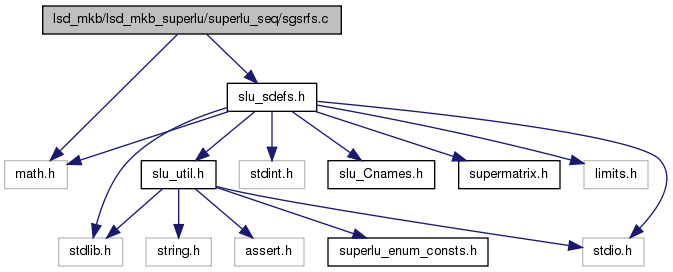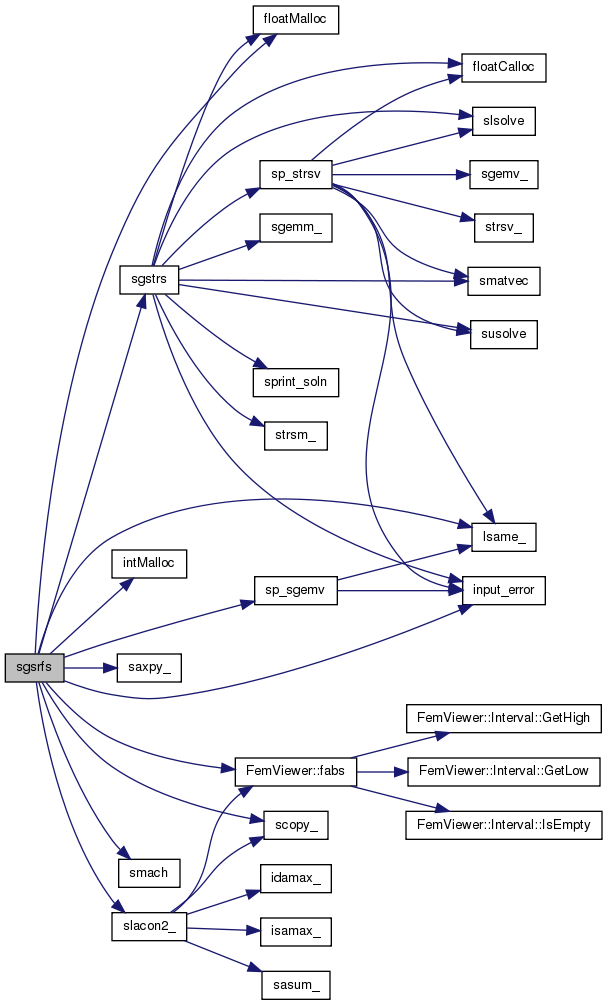Purpose
=======
SGSRFS improves the computed solution to a system of linear
equations and provides error bounds and backward error estimates for
the solution.
If equilibration was performed, the system becomes:
(diag(R)*A_original*diag(C)) * X = diag(R)*B_original. See supermatrix.h for the definition of 'SuperMatrix' structure.
Arguments
=========
trans (input) trans_t
Specifies the form of the system of equations:
= NOTRANS: A * X = B (No transpose)
= TRANS: A'* X = B (Transpose)
= CONJ: A**H * X = B (Conjugate transpose) A (input) SuperMatrix*
The original matrix A in the system, or the scaled A if
equilibration was done. The type of A can be:
Stype = SLU_NC, Dtype = SLU_S, Mtype = SLU_GE. L (input) SuperMatrix*
The factor L from the factorization Pr*A*Pc=L*U. Use
compressed row subscripts storage for supernodes,
i.e., L has types: Stype = SLU_SC, Dtype = SLU_S, Mtype = SLU_TRLU. U (input) SuperMatrix*
The factor U from the factorization Pr*A*Pc=L*U as computed by
sgstrf(). Use column-wise storage scheme,
i.e., U has types: Stype = SLU_NC, Dtype = SLU_S, Mtype = SLU_TRU. perm_c (input) int*, dimension (A->ncol)
Column permutation vector, which defines the
permutation matrix Pc; perm_c[i] = j means column i of A is
in position j in A*Pc. perm_r (input) int*, dimension (A->nrow)
Row permutation vector, which defines the permutation matrix Pr;
perm_r[i] = j means row i of A is in position j in Pr*A. equed (input) Specifies the form of equilibration that was done.
= 'N': No equilibration.
= 'R': Row equilibration, i.e., A was premultiplied by diag(R).
= 'C': Column equilibration, i.e., A was postmultiplied by
diag(C).
= 'B': Both row and column equilibration, i.e., A was replaced
by diag(R)*A*diag(C). R (input) float*, dimension (A->nrow)
The row scale factors for A.
If equed = 'R' or 'B', A is premultiplied by diag(R).
If equed = 'N' or 'C', R is not accessed. C (input) float*, dimension (A->ncol)
The column scale factors for A.
If equed = 'C' or 'B', A is postmultiplied by diag(C).
If equed = 'N' or 'R', C is not accessed. B (input) SuperMatrix*
B has types: Stype = SLU_DN, Dtype = SLU_S, Mtype = SLU_GE.
The right hand side matrix B.
if equed = 'R' or 'B', B is premultiplied by diag(R). X (input/output) SuperMatrix*
X has types: Stype = SLU_DN, Dtype = SLU_S, Mtype = SLU_GE.
On entry, the solution matrix X, as computed by sgstrs().
On exit, the improved solution matrix X.
if *equed = 'C' or 'B', X should be premultiplied by diag(C)
in order to obtain the solution to the original system. FERR (output) float*, dimension (B->ncol)
The estimated forward error bound for each solution vector
X(j) (the j-th column of the solution matrix X).
If XTRUE is the true solution corresponding to X(j), FERR(j)
is an estimated upper bound for the magnitude of the largest
element in (X(j) - XTRUE) divided by the magnitude of the
largest element in X(j). The estimate is as reliable as
the estimate for RCOND, and is almost always a slight
overestimate of the true error. BERR (output) float*, dimension (B->ncol)
The componentwise relative backward error of each solution
vector X(j) (i.e., the smallest relative change in
any element of A or B that makes X(j) an exact solution). stat (output) SuperLUStat_t*
Record the statistics on runtime and floating-point operation count.
See util.h for the definition of 'SuperLUStat_t'. info (output) int*
= 0: successful exit
< 0: if INFO = -i, the i-th argument had an illegal value Internal Parameters
=================== ITMAX is the maximum number of steps of iterative refinement.



 1.6.1
1.6.1